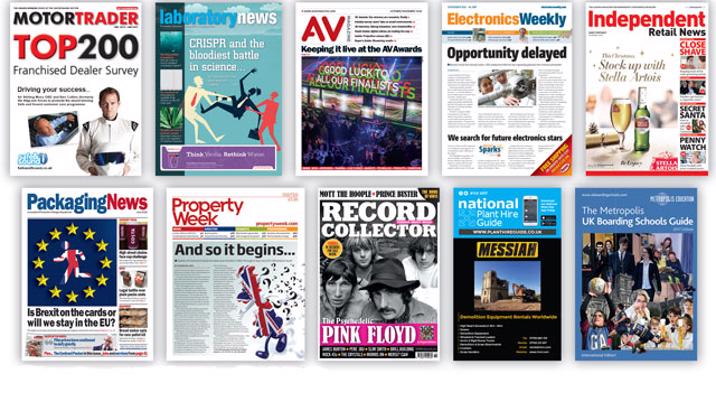
Many publishers these days are concerned with sharpening their focus on core products.
Metropolis International operates along rather different lines. It actively seeks established titles other businesses no longer want and it looks to buy them. And if some of those titles are somewhat in decline, that’s not necessarily a problem. Metropolis grows through acquisition, and it’s been growing very fast indeed: turnover is now £30m, up from £6m ten years ago.
Portfolio approach
The company consists of a somewhat eclectic mix of 31 brands, from business and consumer magazines, to discount and loyalty programmes, and business software. Around two-thirds of the company’s brands are B2B.
According to chief executive Robert Marr, Metropolis investors view the company as a “miniscule” version of Warren Buffett’s Berkshire Hathaway, in that it most resembles a portfolio company that looks for sound, under-valued businesses and then, in Metropolis’s case, buys them. At its heart, Marr stresses, Metropolis is a media-tech company, although he acknowledges its acquisition strategy has become far broader than that.
The pattern over the last decade has been fairly consistent: the company has looked at around 50 businesses a year as potential acquisitions, offered on ten and ended up acquiring two. The great majority of these have been media or software businesses.
Two key sources of potential acquisitions continue to be larger companies looking to divest non-core brands, and private owners of smaller companies who want to sell, perhaps because they’re retiring, perhaps because they just want to launch something else.
“A large, perhaps listed group, divesting something that’s non-core is an important source,” says Marr. “Something that’s not strategic and that they perhaps find hard to justify to analysts.”
Often such titles may need a little TLC to bring them back into shape, Marr says. “They're often neglected. If the group decides it wants to do information or exhibitions and they've got a magazine business, the group’s strategy often won’t talk about that, the chief executive won't walk to their floor, and the best managers won't want to stay with it. So, yes, they get neglected.
“In a big organisation, this can lead to huge inefficiencies and it’s not unusual to find teams that simply don't know who is supporting them – who’s responsible for subs, who’s handling digital marketing, the email blasts and so on,” Marr says.
Smaller, private companies tend to have owners who are deeply concerned about staff continuity. “Usually, the last thing they want to see is some organisation coming in just to slash and burn, and taking people out in order to integrate the business – they like the thought of the business and the people carrying on.”
For Metropolis, it makes perfect business sense to take an ethical approach to satisfy such a seller, rather than immediately looking to make cuts through streamlining. If the company takes on a publication, it will send in people to sit with an incumbent team – with designers and production staff, for example – to look for improvements, rather than immediately centralising those roles. The reason, says Marr, is that it’s important to be sensitive to brands as individual entities, and Metropolis very much sees itself as a federation of its brands. “We’re very brand-focused and there are not a lot of people sitting outside of those brands. The managers running those businesses are often the experts, so why risk that?”
Acquisition criteria
What then does the company look for in a potential acquisition? Running the numbers is clearly part of the process; but, perhaps surprisingly, growth, while certainly desirable, is not always essential. How a publication is faring against competition within its niche is of primary importance. “We’d ask, ‘is it dominating its niche?’, which is what we aspire to,” says Marr.
“So, we look at market share and the ability of the team to innovate. We look for people who are passionate and entrepreneurial and hardworking and bottom-line focused.
“And, actually, that makes a real difference – if you've got a team of people that works together and likes each other and really likes the brand they work for, they probably will do well, even when the industry is not doing so well,” Marr says.
“So, you literally take on anything that seems to fulfil those criteria. It doesn’t have to be about particular sectors – we certainly don’t look at the market and say we need to get into … antiques or something.”
The aim is for a newly acquired business to be around in at least a decade’s time, Marr says. And that does not exclude looking at businesses in decline, so long as that decline is slow.
“Yes, we look at these brands,” says Marr, “and we accept that decline. A publication might have sales edging downwards and a lot of people wouldn’t be interested in that. But we’d be thinking that a high-growth business obviously has its own risks – it’s got to keep delivering that growth.
“Whereas with a product that's stable and mature, you might think, well, this business has been trading solidly for ten years and been doing well. It's strong in its niche. It's got barriers to entry, and it's got a plan and IP. It's got good management. We think it will be here in ten years' time. And if it's going down one per cent a year, say, that’s 10% smaller in ten years, well, so be it – it'll still be generating profit.”
The acquisition process itself often produces unique insights that can later be usefully shared with staff to reinvigorate a brand.
“On the B2B side, we’ve got three division MDs and they’d be very involved in the acquisition process, sitting in the management meetings,” says Marr. “As part of due diligence, we’d call up customers, we look at reader surveys and talk to readers, so we get a very good view of a business, and we will always share that view with the team that has just come on board, because it’s often gold dust and they wouldn’t normally get it.”
Achieving synergies
With seven offices in disparate locations and the federation of brands approach, Marr acknowledges there is a risk potential synergies across the company could be missed. Over the last two years, in particular, efforts have been made to increase knowledge sharing across brands and, importantly, to create a sense among staff that they belong to a bigger entity than just the brand they work for. This is achieved through social events, as well as more formal presentations to share knowledge.
Some functions, though, are simply more efficient when they are centralised and carried out at scale. Not only HR and accounting, but also putting 24 brands on a common digital platform instead of a dozen separate ones, for example. And centralisation also works best for SEO expertise, email databases and researching audiences, says Marr.
“Increasingly, we’re looking at audience, getting real insight into an audience and communicating this to advertisers.”
Two years ago, the company launched a project to build a central database that cross–referenced data from 600 lists in order to build a much fuller profile of readers who make up the Metropolis community.
“We can then say, this is a very high quality, engaged community that advertisers will want to reach and we will also look to serve up segments of that community within titles and create value from that,” says Marr. The future, he says, is all about further segmenting audiences for advertisers.
“Even within that niche audience, we will break it down into personas. In the property world, you might be into residential property or you might be into student accommodation, or an agent and so on,” he says.
“So, it's gone from, this is the sort of people we have, to these are the groups of people within a niche. And then, obviously, the next step will be to start to do a little bit more around actual personalisation.”
In terms of meeting advertisers’ needs, Marr believes it is important that any one channel is not seen as dominating, but instead viewed as part of an aggregate approach.
“Three or four years ago, I think, everyone was saying physical products would go,” Marr says. “But, no. They're definitely a part of the mix. And for us, actually, a third of our revenue is still from the printed product.
“So, we're media neutral in the sense that what we try and do is come up with solutions that say, if you want to achieve this result, what's your strategy? And this might be a mix of advertising, sponsorship, webinars, lead generation, a video we could do for them, or sponsoring an event – it will all depend on what an advertiser is seeking to achieve.”
Marr sees the overall strategy of growth through acquisition continuing in the future.
“It's one of the great things about media – there are so many brands, and people are always swapping them,” he says. The trend of larger companies selling off non-core assets still has plenty of play, he believes; and the conditions driving smaller, private sellers will, if anything, intensify.
“I think in some cases, people think the world’s changing. Maybe someone’s 70 years old and they’re perhaps struggling with launching events, for example; maybe they think, ‘How do I do a conference?’ They’ve never done one before. So, the challenge for them is not only about doing digital, which can certainly be a real challenge, especially without scale. I think there are a lot of people who are retiring and selling simply because the business has all become much more difficult.”
Launched: 1994
Chief Executive: Robert Marr
Publications include: Property Week, Packaging News, Record Collector, Irish Medical Times, Electronics Weekly, Motor Trader, Independent Retail News
Most recent launch: Daltons Business
Turnover: £30m
Employees: 300
Website:www.metropolis.co.uk












